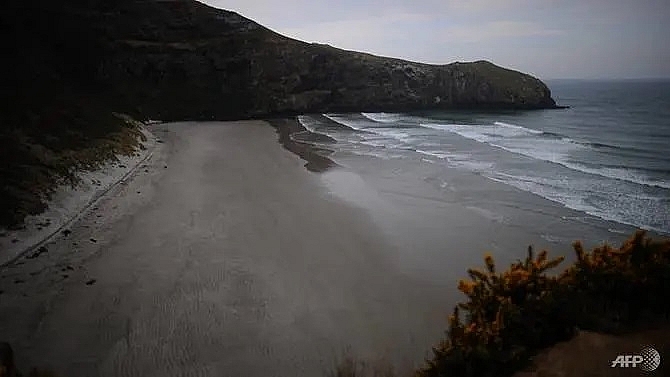Tourists trampling on New Zealand's tranquility: Report
 |
| Waves roll in towards a deserted beach on the Otago peninsula near Dunedin, on Sep 7, 2011. (Photo: AFP / CHRISTOPHE SIMON) |
The South Pacific nation has long marketed itself as "100 per cent Pure" and "clean and green", but has seen a huge growth in visitors in recent years, from millenials snapping selfies at Lord of the Rings filming locations, to climbers, hikers and wildlife enthusiasts.
The report from parliamentary commissioner for the environment Simon Upton comes as New Zealand's adventure tourism industry is already under intense scrutiny over last week's White Island volcanic eruption, which killed 16 international travellers and two tour guides.
Upton said New Zealand - with a population of 4.9 million - attracted almost four million international visitors annually and the number could treble by 2050.
He said infrastructure was already strained, the environment was under pressure and many of the qualities associated with New Zealand were disappearing.
"The sheer numbers of people are eroding the sense of isolation, tranquility and access to nature that many overseas tourists seek when visiting New Zealand," he said.
"We need to ask: 'Are we in danger of killing the goose that laid the golden egg'?"
Upton said New Zealanders were also part of the problem, pointing out that Kiwis on domestic holidays outnumbered overseas tourists at major holiday spots.
He said New Zealanders had become accustomed to the sight of renowned attractions such as the Tongariro Crossing being "besieged with visitors" and the problem would only intensify.
Upton said for too long the tourism industry had escaped the environmental scrutiny imposed on other sectors such agriculture and mining.
"TOURISM AT ANY COST?"
However, there was little incentive for the government to restrain the country's most lucrative industry, generating about NZ$16.2 billion (US$10.7 billion) in export earnings annually.
"We didn't get to where we are overnight - the phenomenon of crowded sites, crowded skies and crowded parking lots is the result of more than a century's worth of promotional taxpayer subsidy," he said.
"What will another three decades of more of the same mean?"
Upton said more visitors meant more greenhouse gases from flights to New Zealand and more waste entering the country's waterways, as well as a higher risk of tourists importing pests and bio-security hazards.
Upton's role as commissioner is to produce independent reports highlighting issues facing the environment for parliament, rather than the government of the day.
He said he only highlighted problems in the report, and planned to wait for feedback then put forward solutions in a follow-up paper.
Trade body Tourism Industry Aotearoa said it was committed to sustainability and agreed with Upton's assessment that new approaches were needed to manage environmental impacts.
"Nobody wants tourism at all costs ... we want to work with our communities to shape the tourism future they want," TIA chief executive Chris Roberts said in a statement.
What the stars mean:
★ Poor ★ ★ Promising ★★★ Good ★★★★ Very good ★★★★★ Exceptional
Related Contents
Latest News
More News
- Manila becomes a new check-in destination for Vietnamese youth (December 11, 2025 | 18:07)
- Vietjet launches mega year-end ticket promotion (December 10, 2025 | 11:33)
- Dalat leads Vietnam’s 2025 search trends (December 09, 2025 | 13:44)
- Vietnam welcomes record wave of international visitors (December 09, 2025 | 13:43)
- Vietjet launches daily Manila flights to celebrate year-end festive peak season (December 05, 2025 | 13:47)
- The destinations powering Vietnam’s festive season travel demand (December 04, 2025 | 18:33)
- Vietnam named among the world’s most exciting winter destinations (December 04, 2025 | 15:10)
- Phu Tho emerges as northern Vietnam’s new tourism hub (December 01, 2025 | 17:00)
- Vietjet completes Airbus A320/A321 updates ahead of deadline (December 01, 2025 | 09:49)
- Vietjet resumes Con Dao flights from early December (November 28, 2025 | 15:24)

 Tag:
Tag:




















 Mobile Version
Mobile Version